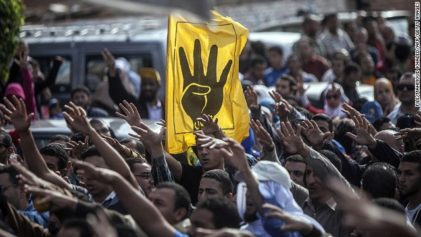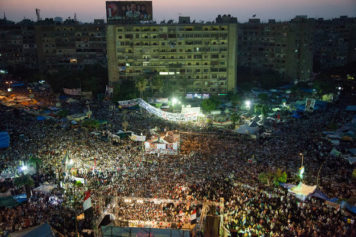“Long Live Free Art,” the rallying cry and title of an exhibition that closed in Cairo on Jan. 15, succinctly expressed the Egyptian art world’s growing resistance to the new constitution.
The constitution was approved at the end of December, handing a majority victory to Islamists. Artists, curators, critics and academics have united against Egyptian President Mohamed Morsi and his controversial charter, which they say threatens freedom of expression and creativity. Resistance is increasing in other ways, too — through mass protests, works of art in the street, open letters and artists’ statements. More demonstrations calling for a consensual constitution are expected on Jan. 25, the second anniversary of the revolution that swept through Egypt.
Cultural coalitions have also been growing in number. The Egyptian Creativity Front, which led protests against the constitution in Cairo in November and December, is the latest to be formed in opposition to the ruling Muslim Brotherhood and the ultraconservative Salafi Al-Nour party, which wields significant political power and believes society should be governed by strict Sharia law.
According to reports in the Egyptian press in December, Yasser Borhami, a member of the Al-Nour party, praised the constitution for placing “restrictions on freedom of thought, expression and creativity”.
Despite a united resistance to the referendum, there already have been a number of cultural casualties as a result of political tensions. The Alexandria Contemporary Arts Forum, a nonprofit art space, closed in January amid “heightened political and social transitions.”
A report by York University for the British Council, published in December, warns that increasing violence and a lack of political vision is stifling creativity in Egypt.
Legal cases are on the rise too: the secretary-general of the National Centre for Defense of Freedoms is suing Egyptian cartoonist Doaa El-Adl for her allegedly blasphemous depiction of Adam and Eve in the newspaper Al-Masry Al-Youm. In her cartoon, El-Adl depicts Adam and Eve being scolded by an Egyptian angel for not voting in favor of the referendum on the new constitution.
To date, the Muslim Brotherhood has focused on censoring the media in Egypt, with a slew of criminal defamation cases against comedians, television presenters, editors and journalists. Their crime is allegedly insulting President Morsi. But many fear the crackdown on freedom of speech will soon extend to the art world.
“At the moment, there’s an emphasis on television and the movies,” says Keizer, a street artist based in Cairo, who has created several text-based works in response to the constitution, including “Art is Not Forbidden” and “Morsy Beaucoup,” a satirical poke at the president. “[The Muslim Brotherhood] has yet to really discover the art world, but when it does, it will clamp down. We have already had statements in the media from sheikhs saying that all art made in the past 20 to 30 years will be abolished.”
Despite the increased risk of arrest, Keizer says he and his fellow street artists will not be silenced: “We are being propelled more and more to go out in the street and make art.”
Read more: The Art Newspaper

